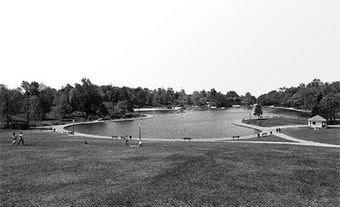
Carmen and Elin Corneil
Corneil, Carmen (b at Niagara Falls, NY 19 Dec 1933) and Elin (b at Trondheim, Norway 23 July 1935), architects, instructors. The partners have contributed, through their design and their teaching in ARCHITECTURE and URBAN DESIGN, to the late Modernist movements in Canada and Norway. They were influenced by the approach of the Nordic and Dutch structuralists of the post- WORLD WAR II period, in which the design of a building or town radically accommodated and enhanced both the immediate natural environment and the human activity within it. Both architects consider teaching to be an important and complementary component of their practice.Carmen Corneil graduated from the UNIVERSITY OF TORONTO department of architecture in 1957, receiving a Pilkington national scholarship, a Royal Architecture Institute of Canada medal and a Wegman travel scholarship. Elin graduated with a diploma from the department of architecture at the Norwegian Institute of Technology, Trondheim, in 1962. Carmen travelled to Europe, working from 1958 to 1960 in the studio of Finnish Modernist architect Alvar Aalto. Aalto's approach highly influenced Corneil's own design philosophy, manifested through a combination of strong sightlines and the complex juxtaposition of public spaces acting as stages for human interaction.
Carmen returned to Toronto with Elin in 1960 and worked for William McBain for one year before the couple opened Carmen Corneil Architects. They designed several small institutional and residential projects in the 1960s, including a competition design for MASSEY COLLEGE at the University of Toronto, the Girl Guides building (Toronto, 1962) and the School of Architecture (Ottawa, 1967, with Jeffrey Stinson) at CARLETON UNIVERSITY. The residential projects, such as the Nick Pearce House (Belfountain, Ont, 1966), looked to both the immediate natural surroundings and to regional vernaculars for inspiration, while the School of Architecture best displays the architects' philosophy by bringing inside the complex interplay of urban streets and views, especially in its multi-storied central corridor.
Both Corneils have taught extensively. Carmen taught at the University of Toronto from 1967 to 1995 (remaining professor emeritus), and was a visiting professor at the Massachusetts Institute of Technology (MIT) and a lecturer at the Town and Regional Planning Institute of the Norwegian University of Science and Technology. Elin taught in Norway and at the Ontario College of Art and Design, and lectured at the University of Toronto and (MIT).
In the 1970s the Corneils began to work in urban design, including the Harbourfront Passage Waterfront Park (Toronto, 1973) and the competition-winning 1977 plan for the rebuilding of the Icelandic town of Vestmannaeyjar, which had been partially buried in a 1973 volcanic eruption. This project initiated an ongoing practice, headed by Elin, in Norway. The partnership also continued in Canada with Carmen Corneil winning a Massey Medal for Architecture for the Wayland Drew house (Port Perry, Ont, 1971).
The 1980s and 1990s saw the Corneils split their energies between Canada and Norway. In Canada, the Wintergreen Commercial Block (Thornhill, Ont, 1982, with David Binder), the McMullen House (Haliburton, Ont, 1988-92), and the Ontario Public Service Employees Union headquarters building (Toronto, 1992), which won a Governor General's medal for architecture, display a more industrial vocabulary that nonetheless remains concerned with the fundamental principles laid down in the 1960s. The Corneils now teach and practise in Norway full time. Their work collection is at the Canadian Architectural Archives at the UNIVERSITY OF CALGARY.

 Share on Facebook
Share on Facebook Share on X
Share on X Share by Email
Share by Email Share on Google Classroom
Share on Google Classroom


